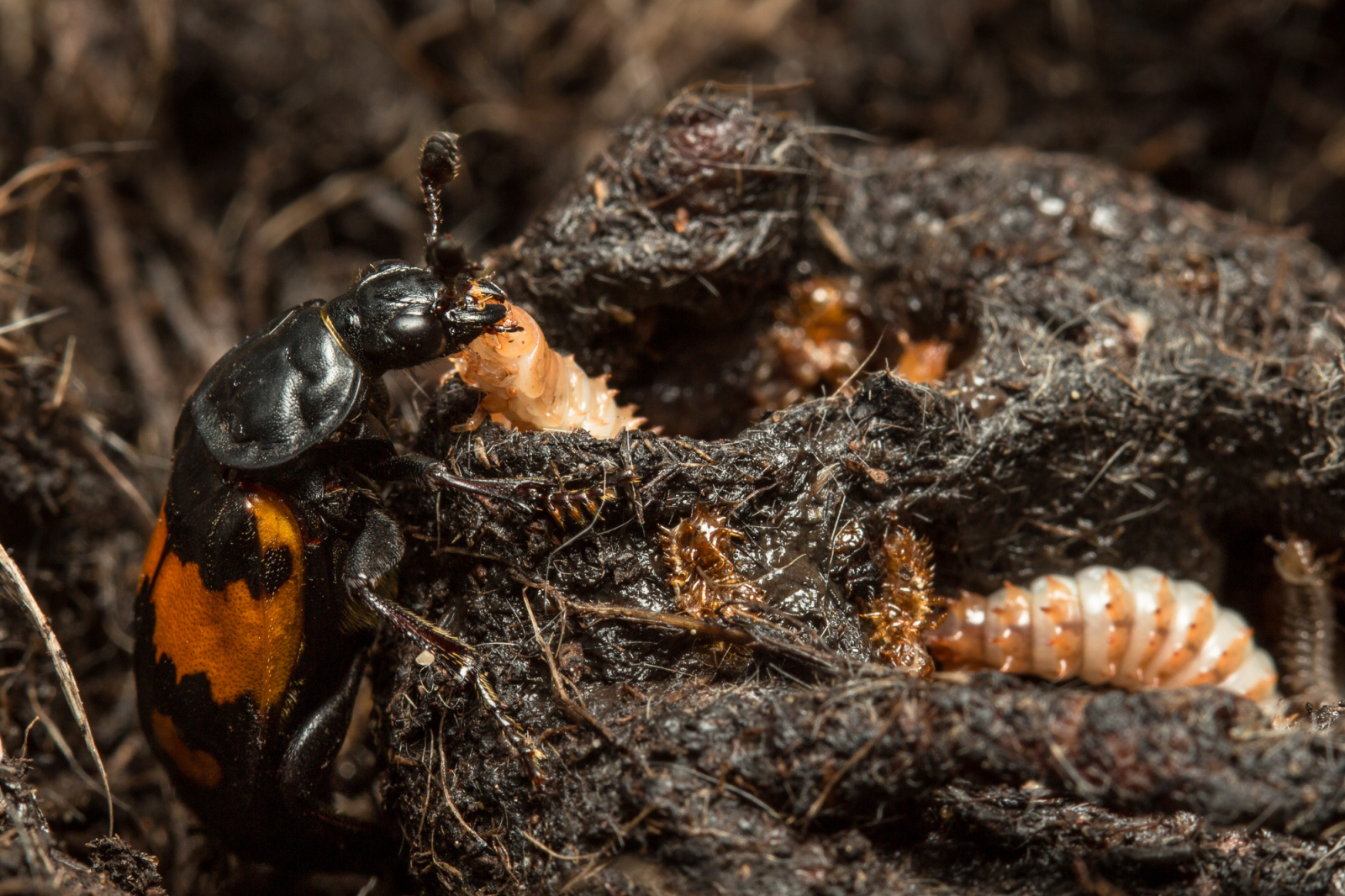Good and bad parents
Interview with
One way to inherit traits from your parents is via genes. But there are other ways, as Rosalind Davies heard from Cambridge University's Rebecca Kilner...
Rosalind Davies heard from Cambridge University's Rebecca Kilner...
Rebecca - Our study focuses on an unusual insect called the burying beetle. The reason it's unusual is because the parents provide care for their young. The reason it's called the burying beetle is because the parents use the body of a small vertebrate like a mammal or a bird as a resource to breed upon. So, they locate the dead body, they strip it of fur or feathers and then they bury it in the soil. The larvae are raised upon the dead body which becomes an edible nest for the offspring. And the larvae can feel themselves on the flesh, but the parents also feed them. And so, they're unusual in providing care for their offspring in this way.
Rosalind - What's your latest paper all about?
Rebecca - We engineered two different sorts of burying beetle parents. So we created good parents and we created bad parents. We did that simply changing the kind of care that those individuals received when they themselves were larvae. So, in our experiment, larvae that received good levels of care then grew up and became good parents themselves, and had offspring that themselves were good parents whereas larvae that were manipulated to have poor levels of care then grew up to become relatively poor parents. And they had offspring that became poor parents as well.
Rosalind - How did you measure whether a beetle was a good parent or a bad parent?
Rebecca - There are actually two ways in which we carefully quantified the quality of the parent. We measured the fitness benefits that individuals gained by providing care and we did that by counting the number of larvae they produced, weighing how heavy they were and then we also measured the fitness costs that they suffered by providing care and we did that by measuring the lifespan of an individual after it provided care. So, good quality parents produce lots of healthy fat larvae and lived for a long time after caring for them whereas a bad quality parent produce very few scrawny larvae and then died quite quickly afterwards.
Rosalind - You also had pairings of one good parent and one bad parent. What did you see from these studies?
Rebecca - When we brought individuals from each of the two lines - so the bad parent line and the good parent line. We brought them back together so the pair together had to raise larvae. What we found here was that it was the good parent that suffered. If it was paired with a low quality parent as a partner, it had a shorter lifespan after raising young than if it was paired with a good quality parent. The mouse that becomes the edible nest for the larvae is also used as a food resource during reproduction by the adults. So, the adults have to balance how much they take from the carcass themselves because they are literally taking food from the mouths of their offspring. What we've shown in previous work is that parents can recoup their costs of looking after offspring by feeding on the carcass themselves. But if they don't feed so extensively on the carcass themselves and they don't recoup these costs of reproduction and that shows itself as a shorter lifespan. So perhaps what happened in this experiment was a good parent worked very hard to look after the offspring and harder than it might have done otherwise. It chose not to feed on the carcass itself to recoup the cost of reproduction and instead allowed its offspring to feed on the carcass and in this way, ended up sacrificing itself essentially for the good of its young.
Rosalind - The results that you've got from your study, were they what you were expecting to find?
Rebecca - I think we probably thought that by changing the environment during development, we would find some kind of knock on effect later in adult life. But I suppose the fine detail of the study and in particular, the way it persisted from generation to generation, they were more of a surprise and much more interesting.
Rosalind - All these experiments you've done here in your lab, do you think that the same things happen to these beetles in the wild?
Rebecca - That's a fantastic question and the short answer is we just don't know and I wish we did know.
Rosalind - So ideally, you'd have a sort of beetle style Big Brother in which you could investigate these beetles in the wild.
Rebecca - That would be amazing. If we could mark individual beetles somehow and then track their movements in nature and see what they got up to as we can do with wild bird populations for example, if we could do the same with the insect population, that would be just incredible, but we're some way off being able to do that yet.
- Previous A close look at Parkinson's
- Next Catch me if you can










Comments
Add a comment